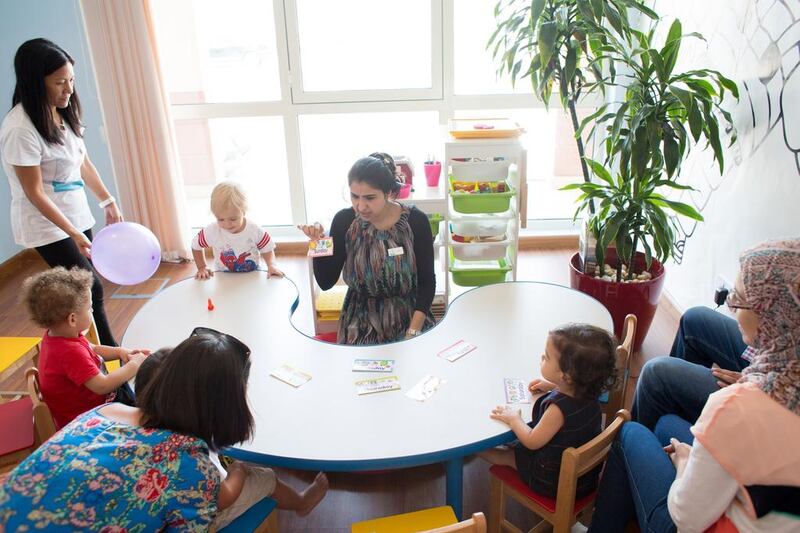Marie, who is 7, smiles back at the lady she’s playing a fun counting game with, swelling with pride that she’s managed to add the set of numbers together.
It could be a scene familiar in any learning environment – except that, bizarrely, the lady she’s playing with is blurting out random words – monkey, French fries, fish – and drumming her fingertips noisily on the table.
Marie is actually undergoing a programme of brain training, and the “trainer”, Deepti, is trying to distract her to give her attention skills a rigorous workout. Marie’s mother has been told that if her daughter does 72 hours of such activities over the course of three months, the changes to her brain’s neural pathways will be permanent and her daughter’s academic performance, and even social skills, will improve.
Marie is undergoing the BrainRx programme at Dots & Links in Abu Dhabi. The programme is also available at Brain & Learning and The Brain Workshop in Dubai. Such brain-training centres are booming these days, with at least six springing up in the UAE since 2011.
It’s not only children with learning difficulties who are enrolling in such programmes, but also those whose parents just want to give their children a cognitive head start in life.
Pooneh Roney, the manager of Brain & Learning says only about 15 per cent of its students have a diagnosed learning difficulty.
“About 80 per cent come to brain-training because they want to improve their concentration and memory – to get homework done faster and achieve better grades. About 5 per cent of our students are very gifted and want to further enhance their cognitive skills to get into top universities such as Harvard.”
But can an investment in brain-boosting exercises really predetermine whether a child ends up attending an Ivy League university?
A 2011 independent study of BrainRx methods (called LearningRx in the United States), performed on 57 Texas high-school students in the US by Oliver Hill, the chair of the Virginia State University psychology department, seems to support the claims that such training can have a long-term effect on the brain. BrainRx outperformed computer-based training and was shown to improve reading skills.
"If you can improve cognitive abilities, then it becomes easier to learn potential new skills and that can have a big effect on a student's future success," said Dr Hill in an article in The Daily Progress.
But Dr Valeria Risoli, a clinical psychologist at Dubai Physiotherapy & Family Medicine Clinic, warns that brain training can only provide part of the solution.
“A child also needs to be supported by a healthy lifestyle, organised routine and family support,” she says. “These centres are extremely helpful, but I also think some parents completely rely on them to ‘improve’ their child’s chances of success. This makes them feel relieved they’re doing their best for their children.
“Parents sometimes forget that they are the first professionals who could help their child overcome difficulties.”
Hana Ahmed’s 8-year-old daughter, Sara, took the BrainRx course at the Brain Workshop and now shows marked improvement in her reading and writing skills.
“Whenever I tried to help Sara at home with her studies, I would get stressed, but the trainer knew how to have fun with her,” she says. “When she got past a certain level, she was given a gift. But she didn’t get home every day until almost 7pm. She was very tired and that was tough.”
BrainRx courses don’t suit everyone. Louise Evans’s 7-year-old son, Sam, was recently diagnosed with mild learning difficulties that involved dyslexia and dyspraxia. The British mother considered enrolling her son at Dots & Links, but was put off by the level of commitment required.
“The programme demands one hour a day, five days a week for three months,” she says. “It’s a huge price, because then Sam’s extra-curricular activities such as tennis and swimming would fall by the wayside. How can I put all my eggs in one basket? They ask an awful lot from parents.”
Instead, she opted to enrol in a course herself – at the Brain Gym, in Dubai – to understand how her son’s weaknesses might be improved by practising certain body movements.
“I’ve done these exercises with Sam before sitting him down to do his homework and it’s helped make him more calm, focused and ready to learn,” she says. “His handwriting also improved.”
Though Evans persists with Sam’s exercises, she remains unconvinced that any one “brain-enhancing” activity can provide the answer.
“The most important lesson I’ve learnt is that it’s a long journey and there’s no magic bullet,” she says. “Getting the diagnosis is easy – finding the right remedy, that’s the hard part.
“There’s nothing anyone can do to get Sam’s brain permanently rewired, life being what it is. At the end of the day, I just want my child to be happy in his own skin.”
artslife@thenational.ae





